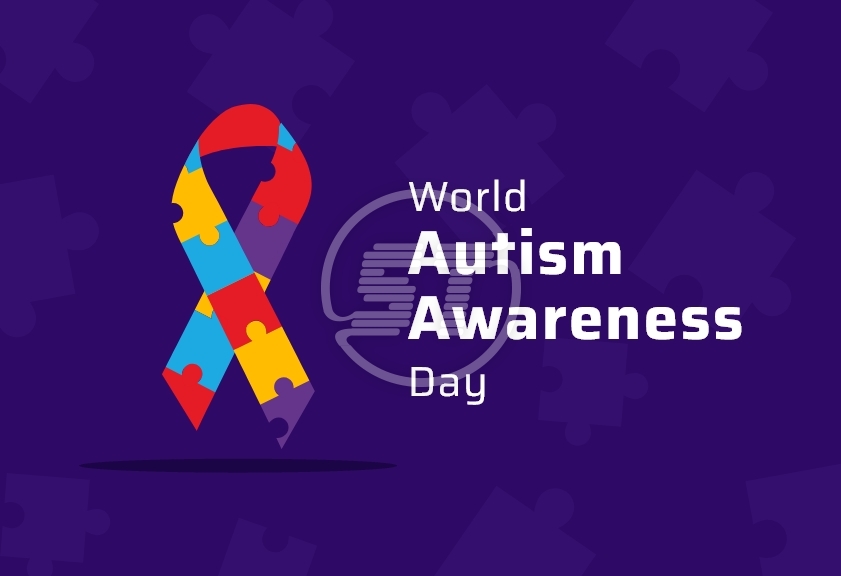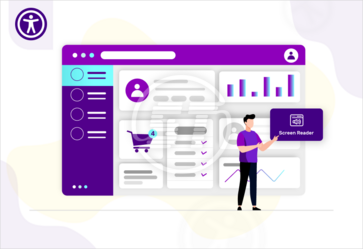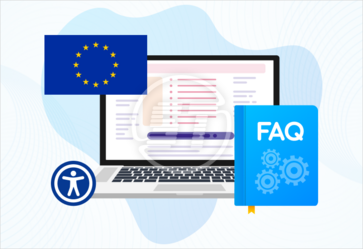World Autism Awareness Day is on April 2nd, and it is internationally celebrated to spread more awareness on autism. Now the world is reliant on digital technologies and thereby accessibility for these technologies is paramount. Observing World Autism Awareness Day is essential to recognize the unique challenges individuals on the autism spectrum face in navigating digital spaces.
Autism spectrum disorder (ASD) is a developmental condition characterized by challenges with social interaction, communication, and repetitive behaviours. While each individual with autism is unique, many shares common difficulties in processing information and interacting with their environment. In the digital realm, these challenges can manifest in various ways, from sensory sensitivities to difficulties with navigation and comprehension.
Thus, by promoting digital accessibility, businesses can create a more equitable online environment for everyone.
The impact of digital accessibility on individual with autism
All users including individual with disabilities can interact, understand, and navigate digital content with ease when digital content is accessible. It is a commitment to ensuring everyone has an equal access and opportunity in the digital world. Individuals with autism are unique in their experience of the world, so digital accessibility is prime and basic concern. It is essential to adapt online spaces to meet the sensory needs of diverse users, just as physical spaces must cater to multiple sensory experiences.
Various situations that require digital accessibility!
There are three common yet significant facets wherein autistic people find issues that become hindrances in learning and grabbing opportunities.
- Issues in Education
- In Workplace
- In Digital world
These three facets in every individual’s life matter significantly and people on the autism spectrum suffer in all of these. The autistic people have unique needs, and they experience things differently. Therefore, it is imperative to provide them with accessible opportunities in education and employment.
Everybody has their own pace of learning and understanding, and so do people on the autism spectrum. Thus, instead of leaving them behind, let’s understand what can be done to cater to neurodiverse citizens.
Some proven ways to mitigate digital accessibility issues!
In education:
Education is one of the challenging areas and World Autism Awareness Day is a bigger opportunity to address some of the important autism issues that impact learning environments badly. There is a lack of knowledge about autism and its challenges among teachers and inclusive technology is also missing wherever needed.
Training resources can improve the learning environment for autistic people!
Schools and educational institutes must educate and engage their professionals in autistic learning to understand the autism spectrum. The training helps resources not only develop teaching skills but also equips them with anxiety and bullying management skills.Learning-friendly classrooms are required!
Children with the autism spectrum are most likely to have concentration issues. Thus, considering this problem, keeping notices and other information on walls with muted colors helps them to read and understand.Clear communication is important!
There should be a clear and consistent timetable to convey the daily routine using images and simple words.
Smart Classrooms with digital aids to make learning easy is another way to bring accessibility in education.
In workplace:
A vast working environment is still having myriad barriers that stop autistic people from pursuing their desired jobs. Moreover, there is a stereotypical understanding that people on the autism spectrum cannot work like others, which is not right. This paucity of awareness needs proper learning to eliminate accessibility hindrances at workplaces.
Switching meeting patterns can be a help!
Keeping meetings’ agendas clear and giving people enough time to process the information is important.Accessible presentation is recommended!
Using easy-to-understand language, large-sized fonts, and a simple layout make a consistent and accessible presentation. Images should be used only if that is the only option and use white space to keep information clear.Inclusion policy should be implemented correctly!
Organizations have written inclusion policies but many of them don’t apply them. To support neurodiverse employees, it is crucial to have accurate implemented policies.
Workplaces must have required and compatible digital assistive technologies for employees so that they can understand and perform their duties aptly.
In the digital world:
Digital experience is a much-needed space to focus on. The above-mentioned two aspects are also dependent on digital help to some extent. World Autism Awareness Day is the right time to spread awareness about the impact of the digital world on autistic individuals. Since several autistic users rely on digital spaces for learning, it must be comfortable and comprehensive for them. Thereby websites make sure to have a clear and simple user experience for everyone.
To make digital spaces accessible, taking user feedback seriously and implementing them wherever needed is a proven hack. Other points to focus on are:
Web pages must be designed for autistic individuals!
Cluttered layouts and heavy texts are difficult to peruse for people on the autism spectrum. Thus, the pages must be short, simple, and consistent to locate. Additionally, the need to scroll one chunk of information should be minimum for uninterrupted reading. Adhering to a minimal design pattern makes a web page accessible to many.Choice of colors impacts the web page accessibility!
Bright colors with too many elements and flashy animations are one of the reasons behind web page inaccessibility for neurodiverse users. WCAG standards also have specific guidelines to apply colors sensitively on web designs.Latest WCAG standards implementation
Update web pages for WCAG 2.2 guidelines to ensure digital accessibility for everyone. A team of accessibility experts can help in auditing and applying the right solutions and remediating the websites. Or else there are accessibility widgets/plugins/modules available (such as All in One Accessibility) that help implement accessibility easily to any website.
Skynet Technologies helps to create an accessible digital world.
Digital technology plays a crucial role in raising awareness about autism. Utilizing digital assistance as alternative methods for skill development shows promise in education and enhancing daily living activities for individuals with autism.
We aim to make the digital world accessible to individuals with disabilities. For that, we offer All in One Accessibility - an AI-based accessibility tool, with several features that help individuals to access digital content easily. We also provide comprehensive website accessibility remediation services including audit, remediation, document accessibility, consultancy, training, ongoing monitoring, and support. For more information reach out to hello@skynettechnologies.com
FAQs
Why is digital accessibility important for individuals with autism?
People in the autism spectrum may have sensory sensitivities, cognitive differences, or motor impairments that affect their ability to use digital technologies. Digital accessibility ensures that these individuals can access and interact with digital content effectively.
What are some common challenges autistic people encounter in a digital environment?
- Sensory overload from bright colors, flashing lights, and loud sounds.
- Difficulty processing complex language or instructions.
- Challenges with fine motor skills, making it difficult to navigate complex interfaces.
- Sensitivity to certain fonts or visual clutter.
What role can digital technology play in supporting individuals with autism?
Digital technology can provide tools and resources for communication and social skills development. However, these technologies must be designed with accessibility in mind to ensure they are usable by individuals with autism.
How can businesses promote digital accessibility for individuals with autism?
- By incorporating digital accessibility considerations into the design and development process of digital products.
- Providing training on digital accessibility and autism to their web designers, developers, and content creators.
- Seeking feedback from individuals with autism and incorporating their perspectives into the design process.
- Advocating for policies and regulations that promote digital accessibility for all individuals, including those with autism.


